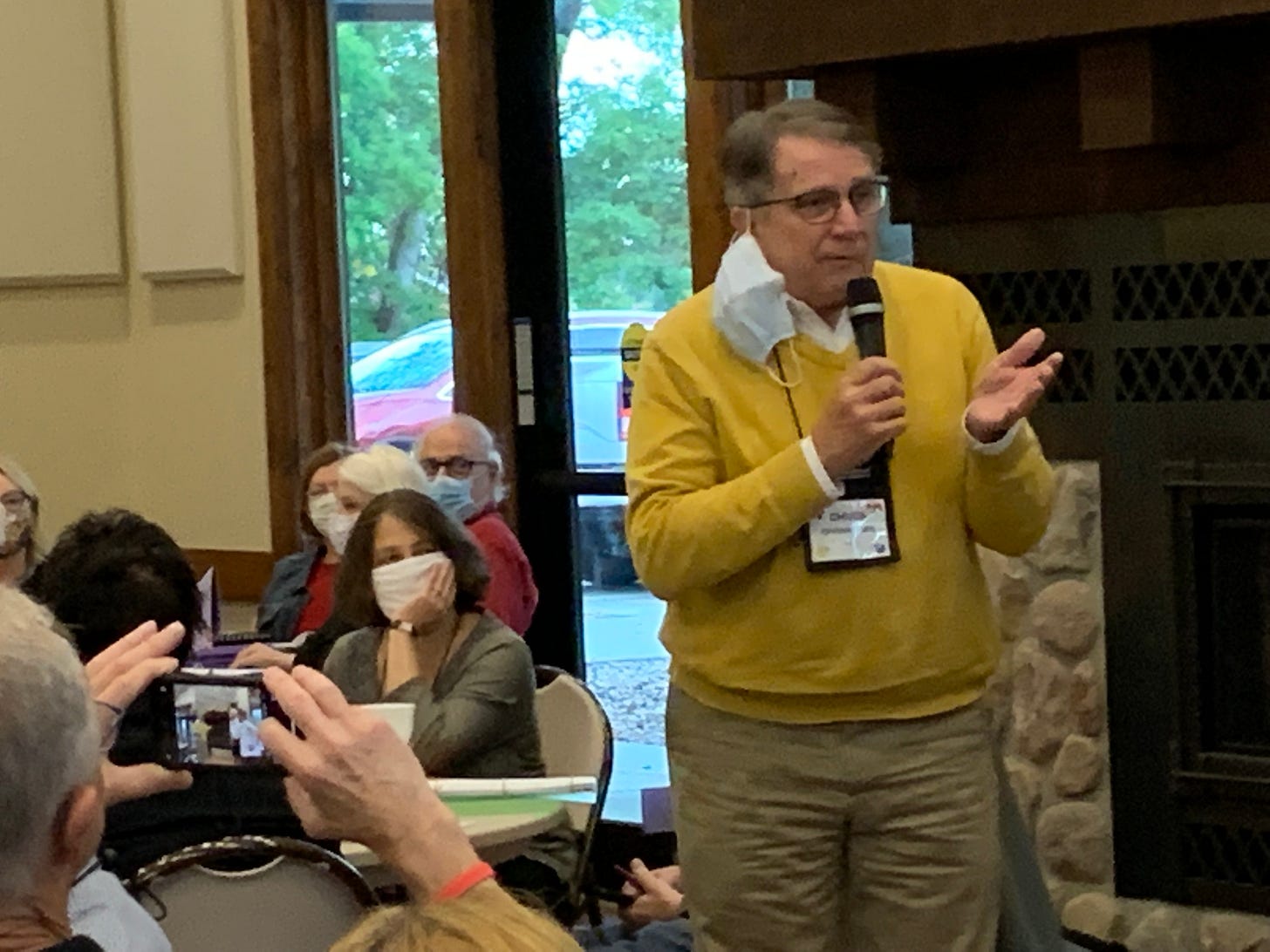I'm BACK!
The first annual Okoboji Writers' Retreat is a wrap...

Whew. I'm back to you, dear Potluck readers. It's been a while. Here's why:
I just had one of the most extraordinary experiences, and by most accounts, so did the 150 or so others with whom I shared the days of September 19, 20, 21, and 22 for the Okoboji Writers' Retreat. This planning has consumed me for months as the complexity and last-minute curveballs overstretched this two-person band (Richard being the other half).
Overheard over dinner on Tuesday night: "Why is it you and I are writers, but we can't describe this experience?"
Yeah.
It was a real mix of folks, mostly Iowans, but several from all over the country. Sandusky, Ohio? Washington, D.C.? Northern Virginia? It's not easy getting to Okoboji from there. But they did. Why? I don't know. The speakers were veteran investigative journalists, reporters, editors who mixed it up with a couple of romance authors, a podcasting rabbi, and an author who had a session on 'spiritual non-fiction.' Memoir writing was a big hit.
On the surface, the differences might have seemed palpable. Yet, the commonality was on full display. The speakers were there to give their support, and they did.
"I can't believe how down-to-earth Chuck Offenburger is," said one long-time reader. Boy, is he ever.
I looked out over the tables of 7 or 8, fully engaged in conversation with their resource. I didn't see anyone hanging back or hanging out in the hallway too cool for school. They were there to learn from some of the best.

One participant just posted a note in the private Facebook group created for those who participated in the retreat and who want to stay connected. Here are excerpts of what she wrote:
"Some of you heard my story that my husband had been killed by a drunk driver. It is the beginning of my memoir but not the whole story. I've learned to live 12 plus years since that terrible night.
"This retreat was life-changing to me because I listened to other participant's life stories of loss and even a story of sobriety; it impacted me in ways I could not have imagined. After sharing my story in the group, one woman told me, 'I could have been that drunk driver.'
The driver who killed her husband also died in the same accident, but she has learned of a connection she has to another young person serving time for an alcohol-related fatal crash. She knew his father and reached out to see if she could contact the young man. Father and son agreed, and she began a new journey of healing that she shared with her retreat companions:
"So I wrote a letter today and am sending it. I am not sure where this will take me, but I plan to journal on my path. I am a bit scared because I am not sure how it will affect me emotionally, but I know it is the right thing to do. This retreat has given me courage.
Thank you."
So it begins—the understanding of another through a story. Through communication.
Real stories matter. Not the 'fakebook' kind.
We have all made mistakes—big ones. Failures. Triumphs. Joy. Loves and loss. The stuff that doesn't make it into the obituary. Or told to future generations.
The roster at the retreat was a band of 'others.'
No one speaker was more important than the other. Oh, Art Cullen won a Pulitzer and had a movie made about him, but he'll tell you he's no better than the next ink-stained wretch.
A 24-year-old woman came up to me at the close with eyes on the verge of tears, saying it was a life-changing experience. The representative from Beaverdale Books, Alice Meyer, said it was the best conference she's attended. And author Leigh Michaels, she of the 100 books, said it, too, was the best event in her experience.
I do not know why. But I have a theory.
We came together from very different political points of view and life experiences for the purpose of learning how to write better or maybe find an agent or freelance gig, and in the process, the commonality of being human kicked in during these small group sessions.

This 'Iowa Nice' thing has become a thing of scorn. There is a toxic stew of hate that's been born and bred by insecurity and disinformation. The wealth gap has wedged its way into our threatened towns, and fear is showing up as anger. As a society, historically, we have relied on local journalism to reflect what's true. As towns struggle, so does local retail, and therefore local newspaper advertising, the traditional business model newspapers. Reporting staff and pages shrink. Fewer stories are told.
I wish I had a cure. But for three days in September, I felt the power of what can happen when people tell what is true for them and the hunger to do so.
One story at a time.

Read speaker Ty Rushing’s review of ‘Storm Lake’ https://iowastartingline.com/2021/09/24/rushing-storm-lake-is-a-love-letter-to-community-journalism/






Congratulations on a great workshop. lovely recounting and Chuck "Iowa Boy' is down to earth
Dear Julie and Richard, Congratulations on a job well done. I am not at all surprised to read about how the experience changed lives, how people felt permission to be themselves, to tell their stories, the good, the bad, and the ugly. They felt safe in the room. I remember the first time I met the two of you, I felt like I could be who I am, just a small town Iowa girl, and it would be okay. Thank you for giving that to me and, honestly, to everyone who has and will cross your path.